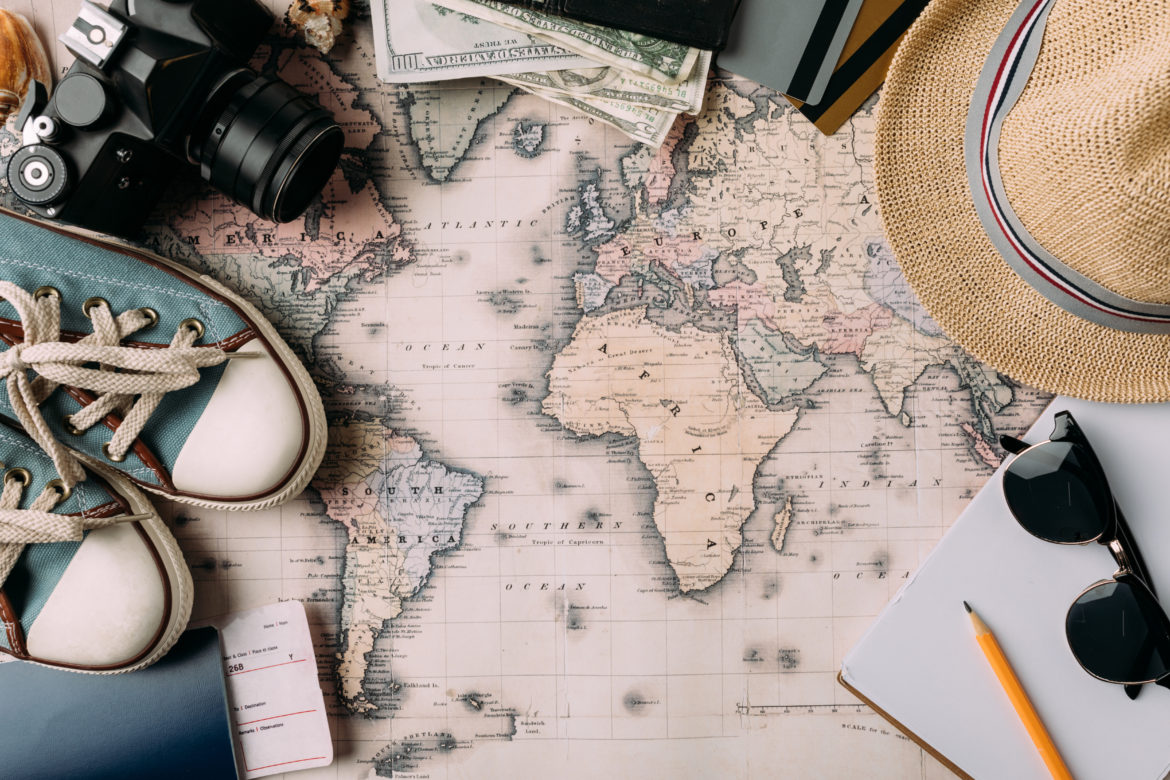Travel
Exploring Your Ancestral Home – A Guide to Genealogical Travel

Visiting the home or land where your ancestors lived is one of the most rewarding experiences for genealogists. However, your expectations must be realistic if you have done extensive research before you go.
Fortunately, many travel companies offer heritage tourism trips for genealogists. These tours can be tailored to your needs and include private accommodations, drivers, guides, and more.
Identify Your Ancestor’s Home or Land
If you are interested in tracing your family roots, then it is worth investigating how to identify the exact location of your ancestors’ home or land. Luckily, several records, such Ireland online genealogy records, will reveal their precise location.
Those documents may include address numbers, street names, and more. These details can help you locate the specific plot of land where your ancestors’ homes once stood and the ruins of any buildings they might have built.
In addition, many county courthouses have old plat maps going back decades or even centuries in some locations. Look through the maps at the courthouse to identify which ancestors lived in which areas during that time.
Once you have pinpointed your ancestors’ location, it is time to start making travel plans. Are you looking for a trip covering a large geographical area, or would you instead focus on exploring the region your ancestors came from?
Map It Out
One of the best ways to discover your Ancestry is by going back in time and “seeing” where your forefathers lived. Then, you can explore how they lived, worked, and played.
A great way to do this is by looking at historical maps of where your ancestors lived and their neighborhoods. These plat maps are often accompanied by records describing the landowners and their property, which can give you a sense of how they might have lived and worked.
Another great idea is to visit a historical society or museum. These might have a display or artifacts especially relevant to your family.
Some historic sites also offer living history exhibits that immerse you in your ancestors’ day-to-day lives. You can learn about what they ate, how they lived, and what they did at any given moment.
Ancestry travel is a growing niche in the tourism industry. The popularity of DNA testing has led to the development of tours that take genealogists on a trip to their ancestral homeland, where they can find out more about themselves and connect with something that’s exclusively theirs.
Go There
Several companies now specialize in genealogical travel, offering group and private tours to regions where birth, marriage, death, and other vital records await discovery. Some companies even offer DNA testing to determine which lands your ancestors came from.
While it might seem daunting, tracing your family history is pretty simple. With a few online resources, such as Ancestry or My China Roots, and some research, it’s easy to trace your ancestors’ roots to almost anywhere in the world.
Ancestral home tourism has grown in recent years thanks to the popularity of sites such as Ancestry and the ubiquity of DNA tests that can tell where your ancestors lived. These new tools allow individuals to discover their ancestral homes much faster and easier.
For many, it’s about more than just a journey to an unknown land – it’s also about reconnecting with a part of their history and heritage that’s deeply meaningful to them. Some people take ancestry trips out of curiosity; others seek a new sense of purpose.
Meet the People
One of the most fulfilling aspects of genealogy travel is visiting the home or land where your ancestors lived, worked, worshipped, or socialized. However, many places have changed, and tracing an ancestral home is difficult.
When planning a trip to your ancestral home, setting goals that are meaningful to you is essential. Are you looking to find your ancestors’ names in local records, visit family graveyards, or connect with long-lost cousins?
Then, you’ll need to decide how to meet your goals. Do you want to search for records at an archive or church?
In addition, you’ll need to decide if you want to visit historical sites or museums that can tell your ancestor’s stories. These could be industrial or logging camps, decommissioned military posts, restored homes or villages, and religious landmarks.
If you aren’t sure where to start, look for a genealogy expert to help you plan your trip. They can also recommend where to search and guide you to archives most likely to have your ancestors’ records.
Take Photos
In the past few years, we’ve seen a rise in interest in ancestral travel. This is primarily driven by genealogy television shows, like Who Do You Think You Are, DNA tests, and the ease with which people can trace their family history online.
For many, tracing their ancestral homes and exploring their heritage is a dream come true. These trips are also a great way to experience new cultures and learn about history.
You can find a variety of tours in various countries worldwide that cater to genealogy and ancestry travelers. These companies typically offer escorted tours that include visits to record holdings for research.
Some tours focus on areas where your ancestors lived, such as Ireland, Scotland, Germany, France, England, Canada, and The Netherlands. These companies often partner with local tourism agencies to promote a genealogical tour.
During the trip, you’ll want to make sure you take lots of photos so that you can document your ancestral journey and keep those memories alive. You may even wish to create a slide show to share with others at your next family reunion.
Travel
Navigating the Expat Life: A Guide for Expatriés

Starting a new life is a thrilling but hard responsibility. Whether you’re moving overseas for personal, professional, or moot details, altering to life as an expat takes careful planning. We’ll cover many aspects of emigrant life in this full guide, giving helpful vision and useful information to help you get the most out of your time away.
Being an expatriate, or living overseas, is an exciting and difficult adventure that leads to fresh knowledge, cultures, and views. Whether you’ve chosen to go abroad for a job, learning, or personal development, adjusting to the difficulties of living as an expat demands mobility, courage, and an open mind.
This area provides expatriés with the required equipment to safely settle into their new homes, from navigating public transportation to using essential amenities.
Getting Ready to Move
Much preparation is necessary before you arrive at your new location. Everything from documentation and visa requirements to speaking ability and cultural acuity are addressed in this section. Knowing the practical aspects of moving can reduce stress and make it a seamless transition to living abroad.
Getting Started
Although moving to new work can be daunting, you can comfortably adapt if you know what to do. We’ll talk about getting a place to stay, creating a support system, and getting informed about the services and amenities that are offered by the area. Studying the essentials of daily life in your host nation, from procuring food to using subways, makes for a positive expat experience.
Developing Cultural Intelligence
Living in another country and seeing its culture is one of the most enjoyable parts of living overseas. Besides addressing the value of cultural ability, this part provides advice on how to promote intercultural understanding. Learning how to adjust to and take different facts of view recovers your expat experience and helps you build permanent networks with residents, from knowing new duties to greedy cultural shades.
Taking Care of Financial and Legal Issues
Taking care of the economic and legal positions of moving overseas takes careful preparation and attention to detail. We’ll go over things like international banking, taxes, health care, and insurance choices. Knowing the fiscal and legal terrain of your final nation is a must to protect your welfare and promise compliance with regional statutes.
Sustaining Emotional Health
Living far away from home can at times seem difficult or isolating, but if you want to thrive as an expat, you must put your emotional health first. This section provides tips on how to deal with cultural shock, deal with a feeling of home, and get help when you need it. Maintaining your mental and emotional well-being increases your resilience and happiness with living abroad, whether you choose to do this through hobbies, self-care routines, or relationships with other expats.
Taking Growth Opportunities
Living overseas has its challenges, but there also exists unequaled chances for both professional and private growth. A life-changing experience and lasting recollections can result from accepting the possibilities of your expat journey, whether it is by learning new skills, increasing your international network, or going to new places. You are urged in this part to embrace confusion, push yourself outside your comfort zone, and take benefit of any opportunity for growth.
Conclusion
Keep in mind that every step of your expat experience presents an opportunity for growth and education. Through careful planning, gaining cultural sharpness, and putting your health first, you can face the difficulties of living overseas with strength and self-assurance. Savor the diversity, treasure the moments, and enjoy the excitement of living overseas.
Travel
How to Plan a Honeymoon on a Budget

Organizing a wedding is a big outlay. Although it is once in a lifetime and you think it is worth it, there are also ways to reduce expenses. If you do not want to skimp on the banquet, you can do it with the honeymoon. And enjoy a honeymoon on a budget.
It is not necessary to choose a very expensive destination if it is not the moment. You will have time to make that trip in all that life together that awaits you. Nor do you carry souvenir bags for all your friends and family.
So, can you have a great honeymoon for little money? Of course!
In fact, the most expensive trips are not always the most enjoyed. Surely your parents or grandparents settled for a weekend away from home or a few days in the Canary Islands or Mallorca. And they have an unforgettable memory that they have told you over and over again.
A closer destination
Some couples believe that the further they go, the better the honeymoon will be. And that is not true at all.
It is true that there are incredible places on the other side of the planet. And probably your dream is to cross the pond even if you have to spend more than 10 hours on a plane.
However, the travel budget is more expensive due to transport costs. And logically, the further, the more it will cost.
If you now have a limited budget for your honeymoon, think about closer destinations. In Europe, there are countries with a lot of charm and perfect for a few days of relaxation, culture, or adventure. And even Spain has corners to discover that would surely surprise you.
Shorter vacations
The more days you are traveling, the more you will disconnect from everything. It is another myth that is not always fulfilled.
Some newlyweds spend two or three weeks getting to know the world. In the end, they arrive more tired than they left and do not enjoy it at all.
In a few days, you will be able to rest and enjoy yourself a lot. Of course, try to take at least a week, especially if you are a few hours away by plane.
Two trips are preferable. One after the wedding and one later than spending it all at a destination.
And if you have a low budget, your pockets will appreciate it.
Set a spending cap
We all know that the cost of travel is not just the price of the hotel and transportation.
Once at the destination, we usually make purchases, excursions, and other superfluous expenses that in the end double the initial cost or even more.
If that’s going to be a ruin, it’s best to set a maximum you can afford. It is not necessary to buy gifts for everyone. The trip is for you and the rest do not need to bring anything because it will also be noticeable in the weight of the suitcase.
Avoid the high season
Celebrating a wedding in the summer has many advantages. But also a drawback when it comes to the honeymoon.
And it is that in most destinations it is high season, and therefore, the prices are higher. A good option, if you want a specific place, is to postpone the trip for a time that is cheaper. That as long as the weather does not prevent it. In the off season, you can get good deals even on luxury rentals like Jamaica Villas. Sometimes, it is better to leave those days for later and after the wedding to focus on other things such as enjoying that new stage.
Organize it on your own
Have you thought about looking for everything on your own? Travel agencies provide security and in this type of trip many prefer not to risk.
But it is also true that these companies have to charge because they make a living from it. And also, everything that bears the nickname “honeymoon” or “honeymoon” is always more expensive.
If you are smart with tracking and shopping on the Internet, you can search for everything without hiring an agency.
It’s more of a hassle and involves time that you probably don’t have but you can also save a lot. Perhaps a friend or brother who is used to traveling a lot can help you. Or do it ahead of time before getting into the last-minute wedding preparations.
These are some ideas to fully enjoy a honeymoon despite having a limited budget. And if you still decide to postpone it, don’t worry. The important thing is the new stage that you start as a marriage. And that is priceless.
Travel
Why You Should Move Near a Beach

Moving is a lot of stress and planning: wouldn’t it be nice to slip away to the beach for a while? The idea of sneaking away from your daily life and getting to take in the sun and sand is so tempting that beaches are now synonymous with vacations. These are the top reasons you should move near the coast! A little surf and sun do the heart some good, after all!
Save Money on Vacations
Why drop a lot of money on a vacation when you can drive down the road whenever you want? If your dream vacation is some fun in the sun on a sandy shore: move out to one, and cut out the middleman. Living near a beach gives you the chance to practice more mindfulness and give yourself the breaks and time off that you deserve. Instead of saving up money to go to Florida, you can instead shop for Jacksonville houses for sale and find one that suits what you want!
Beach Living Helps You Live Longer
There are many examples of people who live near water getting to live longer lives. Whether it’s because they’re more active than the average person, or if it’s because the water gives them a chance to take a break and live their life: the beaches are no joke! A CDC study found that you have around a fifteen percent reduced risk of dying early if you live near a body of water. So why not take advantage of this and try to prolong your life a little?
The Weather Can Be More Temperate
Living next to the water means there’s a higher chance that the weather you’ll live in will be temperate! In cities like Seattle, the warm air off of the ocean ensures that temperatures rarely drop below freezing, despite being further north than Iowa and other famous areas for the amount of snow they receive. Although snow can be nice to have every once in a while, if you like temperate weather, there’s nowhere to move besides a beach!
You’ll Meet More Interesting People.
Living near a beach ensures that tourists will sweep into town for the entire season. From late spring to mid-fall, there will be a lot of people who aren’t locals coming to enjoy the sand. Although this may annoy some people, it’s great for anyone who wants the chance to get to know some new people. Living in a tourist-heavy area ensures that you’ll meet new and interesting people without having to worry about a long-term friendship with them if it doesn’t work out!
The Moisture In The Air Is Good For You
The amount of water in the air of oceanside areas is fantastic for your skin, hair, and nails. Although it’s rough in the summer when the heat and humidity can be overwhelmingly thick, the perks far outnumber this flaw! The moisture in the air helps you fight against eczema, nail splitting, or dry hair. In addition, you can enjoy naturally hydrated skin that will feel softer after you’ve lived near a beach for long enough.
-

 Apps1 year ago
Apps1 year agoWhy is Everyone Talking About Hindi Keyboards?
-

 Social Media1 year ago
Social Media1 year agoWho is Rouba Saadeh?
-

 Apps1 year ago
Apps1 year agoThings you need to know about Marathi keyboard today
-

 Apps1 year ago
Apps1 year agoStuck with Your default Bangla keyboard? Isn’t it time for a change?
-

 Games1 year ago
Games1 year agoTop 7 Popular Puzzle and Card Games for Relaxing Your Brain on Mobile, Featuring Solitaire
-

 Social Media1 year ago
Social Media1 year agoMati Marroni Instagram Wiki (Model’s Age, Net Worth, Body Measurements, Marriage)
-

 Entertainment1 year ago
Entertainment1 year ago12 Online Streaming Sites that Serve as Best Alternatives to CouchTuner
-

 Entertainment1 year ago
Entertainment1 year agoMovierulz Website: Movierulzz 2021 Latest Movies on Movierulz.com
